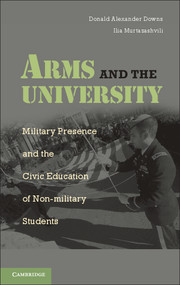2 - Education in the Regime
How a Military Presence Can Enhance Civic and Liberal Education
Published online by Cambridge University Press: 05 June 2012
Summary
It caused us to forget that man has to earn his security and his liberty as he has to earn his living. We came to think that our privileged position was a natural right, and then to believe that our unearned security was the reward of our moral superiority. Finally, we came to argue, like the idle rich who regard work as something for menials, that a concern with the foundations of national security, with arms, with strategy, and with diplomacy, was beneath our dignity as idealists.
– Walter Lippmann, speaking of the national mentality in the 1930sThe inquiry into war, initiated with a profound realization of its paradoxical nature, thus becomes an essential task for all honest self-knowledge. If we are to know ourselves, the supreme commandment of the philosopher, we must know how to think through this paradox. To understand war is to thus to understand ourselves.
– Michael GelvenIn this chapter, we provide a theoretical framework to help us consider how an appropriate military presence on campus can contribute to the civic and liberal education of non-military students. This discussion has a dual character. On the one hand, it is hypothetical in nature, as it lays out the pedagogical possibilities that we consider the most likely to arise in exposing students to a military presence along the lines that we have delineated. These hypotheses will then be compared with the empirical findings that we will address in later chapters. On the other hand, this discussion is unavoidably normative in nature, as it necessarily comprises a theory of what education in this domain can or should accomplish. The normative side of this equation deals with the ways in which understanding national defense and military matters enhances citizenship in a constitutional democracy. Accordingly, this chapter proposes ideas (hypotheses) that we will compare in later chapters with the information we have gathered from archives, interviews, and surveys; at the same time, this chapter constitutes a political theory of citizenship respecting the military and national defense. Like any such theory, the pedagogical theory we present in this chapter is imperfect, subject to limitations and normative disagreement. We offer it in order to initiate discussion about the important matters that are the subject of this book.
- Type
- Chapter
- Information
- Arms and the UniversityMilitary Presence and the Civic Education of Non-Military Students, pp. 40 - 74Publisher: Cambridge University PressPrint publication year: 2012



